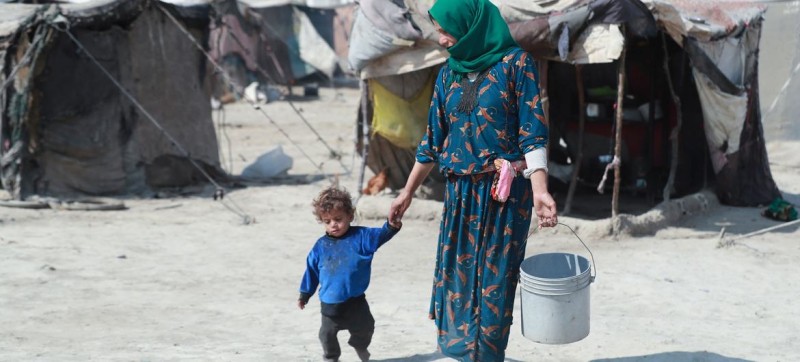© UNICEF/Delil Souleiman A family living in an informal settlement in Raqqa city, northeast Syria. Tweet URL
“As we move into 2023, the Syrian people remain trapped in a profound humanitarian, political, military, security, economic and human rights crisis of great complexity and almost unimaginable scale,” said Geir Pedersen, UN Special Envoy for Syria.
Outlining recent developments, he reiterated his previous calls for calm on the ground, good faith engagement in Syria’s stalled Constitutional Committee process, and the Security Council’s critical humanitarian support.
‘As dire as ever’
As a first priority, Mr. Pedersen emphasized that a nationwide ceasefire remains essential to resolving the conflict.
Noting that 2022 saw periods of relative calm as well as times of escalation, he said January has so far produced an equally mixed picture.
Fewer airstrikes have been reported in northwest Syria, and the intense military escalation in the country’s northeast, seen in late 2022, has receded.
“But in other ways, the picture remains as dire as ever,” he said, noting that shelling, rocket fire and intermittent clashes have continued along all contact lines, involving a wide spectrum of actors.
In addition, ISIL remains active in the country, with sleeper cells killing both military personnel and civilians.
Needs at ‘highest level’
Turning to Syria’s unrelenting humanitarian crisis, the Special Envoy thanked the Council for its unanimous adoption of resolution 2672 (2023) earlier this month.
The resolution renewed, for six more months, the controversial cross-border aid delivery mechanism that brings food, medicine and other critical supplies into Syria through a crossing point on the Turkish border.
However, he stressed that the scale of need in Syria is at its highest level since the conflict began, with record poverty, record food insecurity, and basic services breaking down – capped by a burgeoning economic crisis.

© OCHA/Bilal Al-hammoud A displaced family from El Teh village, now living at the El Teh camp in north-west Syria.
Harsh winter, economic crisis
Joining Mr. Pedersen in briefing the Council was Ghada Eltahir Mudawi, Deputy Director of the UN’s humanitarian affairs coordination office (OCHA), who emphasized that the Syrian people “rightfully expect” the meaningful support of the global community.
“Having endured 12 years of conflict and humanitarian crisis, they face the worst year yet, with 15.3 million people – nearly 70 per cent of Syria’s population – in need of humanitarian assistance,” she said.
Civilians, including those living in overcrowded displaced persons’ camps, are facing a harsh winter as well as an ongoing cholera outbreak, fuel shortages and skyrocketing basic commodity prices.
More donor support is urgently needed, she stressed, recalling that the UN’s 2022 Humanitarian Response Plan for Syria was only funded at 47 per cent – its lowest level since the crisis began.
Talks stalled
Special Envoy Pedersen said another crucial priority is to see Syria’s Constitutional Committee resume and make more substantive progress towards ending the conflict.
Founded after months of painstaking efforts in 2019 with three main constituent groups – the Syrian Government, the opposition and civil society – the Committee has been stalled since May 2022, when it held its eighth and most recent meeting.
No progress has been reported since Russia criticized the Committee’s choice of venue, and the Syrian Government’s nominees failed to arrive in Geneva.
“The Constitutional Committee could be a door-opener and […] contribute to the wider political process,” said Mr. Pedersen, pledging to support a reconvening of the body without delay.




Comments are closed.